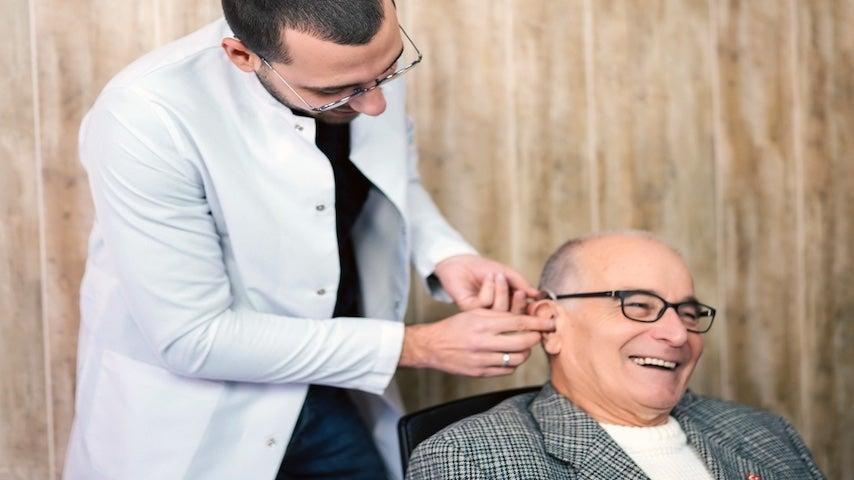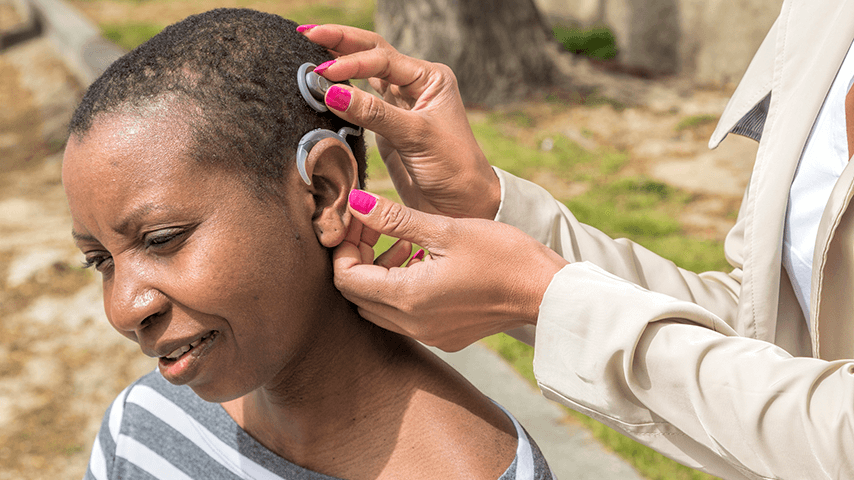
Related Topics
Loss of hearing is a common complaint among older adults, whether it’s caused by genetics, noise, illness, or age. According to the National Institute on Aging, approximately one in three people between the ages of 65 and 74 suffers from hearing loss.
Losing your ability to hear can dramatically impact the way you interact with others and experience life. It can also put you at greater risk for developing mental health disorders such as anxiety and depression. In fact, hearing loss and depression in older adults go hand in hand. One study showed that older adults with deafness were 47% more likely to experience depression symptoms. For those who already have mental health issues, hearing loss can worsen the problem.
The connection between hearing and mental health
Hearing and speech are vital to our ability to communicate with other people through language. Free-flowing communication allows us to build fulfilling relationships and enjoy a vibrant life experience; it’s an essential part of being human.
How does a hearing impairment affect you emotionally? Deafness—whether mild, moderate, or total—interferes with our ability to communicate and socialize. It affects the quality of our interactions with other people, whether we’re trying to understand someone on the phone or order a meal in a restaurant. Losing the ability to hear and interpret things clearly can make a person feel separate from the rest of the world.
What are the psychological effects of hearing loss?
Participating in everyday casual banter is not easy for those who don’t hear well. The individual might feel shame, awkwardness, and inadequacy because they’re not able to understand others or keep up with the discussion. The inability to hear clearly can cause disorientation, leading the person to behave in socially unacceptable ways such as speaking out of turn—and this only heightens their embarrassment. Some might even experience paranoia and believe that others are talking about them.
For seniors who struggle to hear every day, the mental exhaustion can cause them to simply give up. They might eventually start skipping birthday parties, dinners, holiday gatherings, and other events where large groups of people gather in noisy settings. While this self-imposed reclusiveness may seem easier, over time it can make the person socially isolated, lonely, and depressed. They may feel like an outlier within their own families and social groups—an observer in life rather than an active participant.
Below are some other important ways in which hearing loss can influence mental health:
- Adults with hearing loss may become anxious about missing phone calls and alarms. They may worry about mishearing what others are saying to them or feel guilty about misunderstandings.
- The social exclusion and loneliness linked with hearing loss can predispose people to schizophrenia. This is thought to be caused by increased dopamine sensitivity.
- How does hearing loss affect the brain? The task of processing the sounds we hear helps our brain stay active. When you lose some or all of your hearing, the part of your brain that performs this task can atrophy (deteriorate). This can cause cognitive decline, which includes symptoms such as difficulty thinking and concentrating.
- Since hearing loss affects balance, it can cause avoidance of physical activity, which in turn may lead to depression.
- People who hear normally often assume that speaking loudly and repeating words is an appropriate response to an older adult with deafness. However, this behavior reinforces misconceptions that seniors with hearing loss are "slow." Internalizing this notion can intensify the emotional distress of losing one’s hearing.
Losing the ability to hear represents a significant loss. And like with any loss, it’s often followed by a grieving period. The grieving process may involve feelings like anger, resentment, sadness, and depression, followed ultimately by a sense of acceptance.
Strategies for coping with hearing loss and depression in older adults
If you’re facing a loss of hearing, it doesn’t have to define you or prevent you from living a full and happy life. Below are some tips that can help you become empowered and proactive about your personal limitations.
1. Visit a health care professional. Hearing loss can be effectively treated and managed in ways that were not possible even a few years ago. Many people have trouble admitting they need help. But early action is important, since hearing loss left untreated can worsen. Start with your primary care provider. If they aren’t able to diagnose your condition, you may be referred to another professional (e.g., an audiologist, otolaryngologist, or occupational therapist) who can evaluate your situation and help you explore all of your options. Depending on the type of hearing loss you have, treatment options may include one or more of the following:
- Surgery
- Hearing aids
- Auditory training
- Assistive listening devices
- Medication
Feeling nervous about seeing a doctor for your hearing loss? Ask someone you trust to accompany you to your visit. If it’s your spouse or family member who is hard of hearing, assist them in scheduling an appointment and offer to go with them.
Regaining the ability to hear clearly can counter the anguish of hearing problems and restore your quality of life. A 2020 study published by The Journal of the American Medical Association found that the use of hearing aids reduced the risk of psychological distress resulting from hearing loss.
2. Seek mental health counseling. In addition to therapeutic interventions, consider seeing a therapist who has experience working with adults who have lost their hearing. They can assist you in navigating the grieving process and develop healthy coping skills and strategies. They can even help you find meaning in your loss, so that you can continue to find joy in your life.
3. Surround yourself with knowledge and support. If you or a loved one is dealing with hearing issues, you are not alone. There are many organizations that are dedicated to advancing hearing loss education and awareness. Hearing Loss Association of America, for example, provides information and resources on hearing loss prevention, causes, and treatments. Their website also connects you to online communities and in-person support groups in your area, where you can exchange experiences with others facing the same challenges as you.
Hearing loss and other aging-related changes can bring on a range of difficult emotions. If you or someone you know is experiencing depression and/or suicidal thoughts, help is available. Learn more at 988Lifeline.org. Contact your doctor or dial 988 to reach the National Suicide Prevention Hotline if you need immediate help. Hearing aids can be sold directly to consumers in stores or online without a medical exam or a fitting by an audiologist.
NCOA will continue to provide updates as more information becomes available from the FDA. If you're still unsure what type of hearing aid you need, be sure to speak with an audiologist or hearing aid specialist who can provide guidance.




